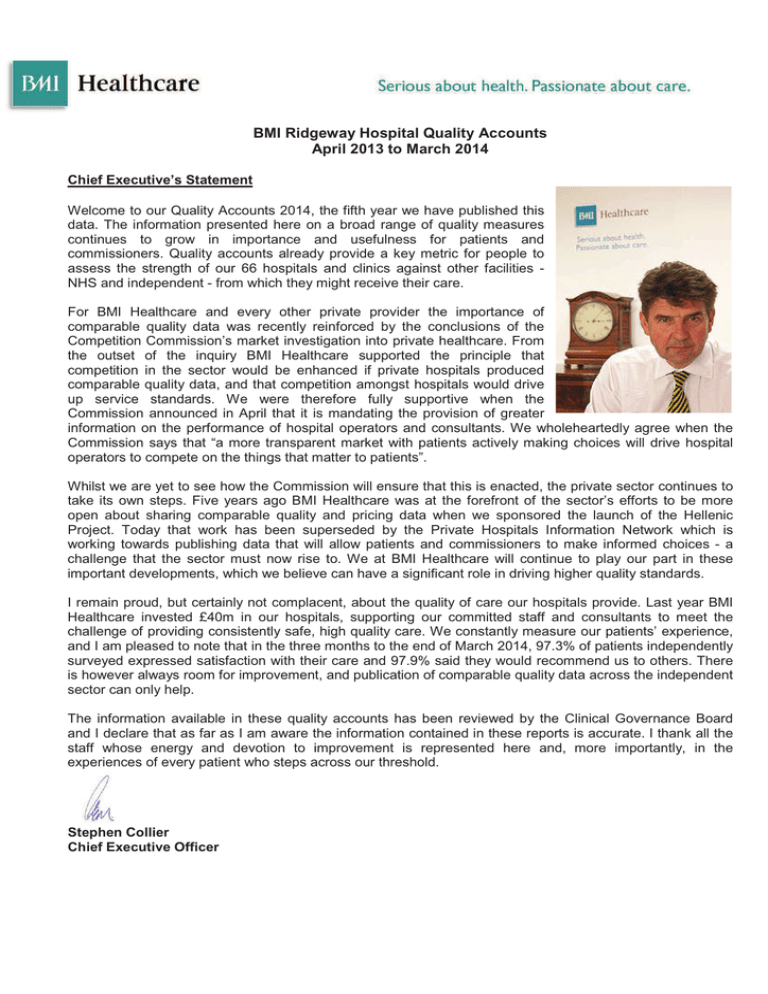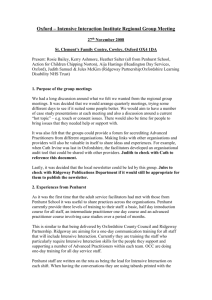
BMI Ridgeway Hospital Quality Accounts
April 2013 to March 2014
Chief Executive’s Statement
Welcome to our Quality Accounts 2014, the fifth year we have published this
data. The information presented here on a broad range of quality measures
continues to grow in importance and usefulness for patients and
commissioners. Quality accounts already provide a key metric for people to
assess the strength of our 66 hospitals and clinics against other facilities NHS and independent - from which they might receive their care.
For BMI Healthcare and every other private provider the importance of
comparable quality data was recently reinforced by the conclusions of the
Competition Commission’s market investigation into private healthcare. From
the outset of the inquiry BMI Healthcare supported the principle that
competition in the sector would be enhanced if private hospitals produced
comparable quality data, and that competition amongst hospitals would drive
up service standards. We were therefore fully supportive when the
Commission announced in April that it is mandating the provision of greater
information on the performance of hospital operators and consultants. We wholeheartedly agree when the
Commission says that “a more transparent market with patients actively making choices will drive hospital
operators to compete on the things that matter to patients”.
Whilst we are yet to see how the Commission will ensure that this is enacted, the private sector continues to
take its own steps. Five years ago BMI Healthcare was at the forefront of the sector’s efforts to be more
open about sharing comparable quality and pricing data when we sponsored the launch of the Hellenic
Project. Today that work has been superseded by the Private Hospitals Information Network which is
working towards publishing data that will allow patients and commissioners to make informed choices - a
challenge that the sector must now rise to. We at BMI Healthcare will continue to play our part in these
important developments, which we believe can have a significant role in driving higher quality standards.
I remain proud, but certainly not complacent, about the quality of care our hospitals provide. Last year BMI
Healthcare invested £40m in our hospitals, supporting our committed staff and consultants to meet the
challenge of providing consistently safe, high quality care. We constantly measure our patients’ experience,
and I am pleased to note that in the three months to the end of March 2014, 97.3% of patients independently
surveyed expressed satisfaction with their care and 97.9% said they would recommend us to others. There
is however always room for improvement, and publication of comparable quality data across the independent
sector can only help.
The information available in these quality accounts has been reviewed by the Clinical Governance Board
and I declare that as far as I am aware the information contained in these reports is accurate. I thank all the
staff whose energy and devotion to improvement is represented here and, more importantly, in the
experiences of every patient who steps across our threshold.
Stephen Collier
Chief Executive Officer
BMI Ridgeway Hospital Information
The Ridgeway Hospital provides extensive acute surgical and medical services for inpatients, day patients
and outpatients. The Ridgeway Hospital aims to meet the health care needs of the community and consults
adult patients of all ages.
Consultants from a wide range of specialties base their practice at The Ridgeway Hospital. They are
supported by a Resident Medical Officer on site 24 hours a day.
The Hospital has 49 beds consisting of 39 single rooms, 3 double rooms and 4 ambulatory care beds. All
rooms have en-suite facilities, satellite television and telephone. Single rooms are important in helping to
maintain the privacy and dignity of patients, however regular contact with friends and family is even more
important when in hospital; to help facilitate contact visitors are welcome at all times between the hours of
8am and 10pm.
The Ridgeway has three operating theatres, one of which has a Stryker Navigation Suite which is an
integrated computer assisted surgery solution. The outpatient facilities consist of 12 consulting rooms and 2
treatment rooms. The physiotherapy department contains a further 6 outpatient rooms, a hydrotherapy pool
and a gymnasium. Our imaging department offers x-ray, ultrasound, open MRI, CT and digital
mammography services. The Ridgeway Hospital has a pathology laboratory onsite operated by a third party.
NHS patients represented 45% of the hospitals overall work. The main specialties were orthopaedics,
general surgery, ophthalmology and urology.
BMI Healthcare are registered as a provider with the Care Quality Commission (CQC) under the Health &
Social Care Act 2008. BMI Ridgeway Hospital is registered as a location for the following regulated
services:•
•
•
•
Treatment of disease, disorder and injury
Surgical procedures
Diagnostic and screening
Family Planning
The CQC carried out an unannounced inspection on 21st January 2014 and found compliance with the
outcomes that they reviewed.
The CQC findings explained that people told us they had all their questions answered and felt involved in the
decision making around their care. All patients had signed consent forms. We found that the discharge of
patients was planned and discussed appropriately. People we spoke with told us they were happy with the
care and treatment they received from the staff. We were told the staff were caring and professional and
treated people in a respectful manner. The hospital took steps to ensure it was a safe place for people to
receive treatment. All staff undertook training in adult protection and contact information was available to
staff should they have a need to report a concern. Staff attended regular courses to ensure they were up to
date with the required mandatory training. They also had opportunities to undertake courses to develop their
professional skills. The hospital had effective systems to monitor and manage risk. Processes were in place
that audited the quality of service delivered and there were opportunities for staff to contribute their ideas or
raise concerns. The hospital had an effective complaints procedure in place that was well advertised to
patients. Regular feedback was also sought from patients.
Ridgeway Hospital has a local framework through which clinical effectiveness, clinical incidents and clinical
quality is monitored and analysed. Where appropriate, action is taken to continuously improve the quality of
care. This is through the work of a multidisciplinary group and the Medical Advisory Committee.
Regional Clinical Quality Assurance Groups monitor and analyse trends and ensure that the quality
improvements are operationalized.
At corporate level the Clinical Governance Board has an overview and provides the strategic leadership for
corporate learning and quality improvement.
There has been ongoing focus on robust reporting of all incidents, near misses and outcomes. Data quality
has been improved by ongoing training and database improvements. New reporting modules have increased
the speed at which reports are available and the range of fields for analysis. This ensures the availability of
information for effective clinical governance with implementation of appropriate actions to prevent
recurrences in order to improve quality and safety for patients, visitors and staff.
At present we provide full, standardised information to the NHS, including coding of procedures, diagnoses
and co-morbidities and PROMs for NHS patients.There are additional external reporting requirements for
CQC, Public Health England (Previously HPA) CCGs and Insurers.
BMI is a founding member of the Private Healthcare Information Network (PHIN) UK – where we produce a
data set of all patient episodes approaching HES-equivalency and submit this to PHIN for publication. The
data is made available to common standards for inclusion in comparative metrics, and is published on the
PHIN website http://www.phin.org.uk. This website gives patients information to help them choose or find out
more about an independent hospital including the ability to search by location and procedure.
1. Safety
1.1 Infection Prevention and Control
The focus on infection prevention and control continues under the
leadership of the Group Director of Infection Prevention and
Control, in liaison with the Infection Prevention and Control Lead
Nurse at Ridgeway Hospital.
We have had: • Zero cases of MRSA bacteraemia in the last year (NHS
1.17cases/100,000 bed days).
• Zero MSSA bacteraemia cases /100,000 bed days
• Zero E.coli bacteraemia cases/ 100,000 bed days
• Zero of hospital apportioned Clostridium difficile in the last 12 months.
Surgical Site Infection data is also collected and submitted to Public Health England for orthopaedic surgical
procedures. Our rates of infection are;
•
Zero for total hip replacement
•
Zero for total knee replacement
The hospital has an annual infection prevention and control audit schedule which covers a variety of topics
including management of equipment, personal protective equipment, sharps safety and waste management
and care bundles.
Our audit results for 2013/14 demonstrated that sharps safety devices were not in use throughout the
hospital and we have subsequently completed training and a roll out programme to ensure this is now in
place. Following an Environment Agency Inspection at another BMI hospital, BMI revised its offensive waste
segregation policy. The revised process now ensures clinical waste is appropriately segregated into
infectious and non-infectious waste which in turn is disposed of in accordance with Environment Agency
regulations. Full compliance was demonstrated with the management of equipment and personal protective
equipment audit.
Infection prevention and control mandatory training is accessed via an e-learning module for clinical and non
clinical staff. Further practical training is provided for clinical staff in the form of hand hygiene and aseptic
non touch technique sessions. Staff are then required to demonstrate competence following attendance.
High Impact Intervention Care bundles are completed on a quarterly basis, the results of these show good
compliance with the indwelling urinary catheter and peripheral intravenous cannula bundles. The prevention
of surgical site infection bundle revealed greater temperature monitoring in theatre was required and the
hospital has since implemented the NICE guidelines for the management of inadvertent perioperative
hypothermia in adults.
Environmental cleanliness is also an important factor in infection prevention and our patients rate the
cleanliness of our facilities highly.
1.2 Patient Led Assessment of the Care Environment (PLACE)
We believe a patient should be cared for with compassion and dignity in a clean, safe environment. Where
standards fall short, they should be able to draw it to the attention of managers and hold the service to
account. PLACE assessments will provide motivation for improvement by providing a clear message, directly
from patients, about how the environment or services might be enhanced.
In 2013 we introduced PLACE, which is the new system for assessing the quality of the patient environment,
replacing the old Patient Environment Action Team (PEAT) inspections.
The assessments involve patients and staff who assess the hospital and how the environment supports
patient’s privacy and dignity, food, cleanliness and general building maintenance. It focuses entirely on the
care environment and does not cover clinical care provision or how well staff are doing their job.
The results will show how hospitals are performing nationally and locally. Results of Ridgeway Hospital
PLACE assessment carried out on 29th April 2013 demonstrated the following results
Cleanliness
Condition, appearance and maintenance
Privacy, dignity and wellbeing
Food and hydration
Ridgeway Hospital
National Inter Quartile Range2
94%
94.71% - 99.38%
87.62%
83.00% - 92.71%
95%
82.38% - 93.14%
94.64%
83.62% - 92.73%
Specific actions were implemented to improve areas where short falls were identified including a review of
cleaning regimes and the introduction of a a redecoration programme. A further PLACE inspection was
undertaken on 24th February 2014 and the results are awaited.
1.3 Venous Thrombo-Embolism (VTE)
BMI Healthcare, holds VTE Exemplar Centre status by the Department of Health across its whole network of
hospitals including, Ridgeway Hospital. BMI Healthcare was awarded the Best VTE Education Initiative
Award category by Lifeblood in February 2013 and were the Runners up in the Best VTE Patient Information
category.
We see this as an important initiative to further assure patient safety and care. We audit our compliance with
our requirement to VTE risk assess every patient who is admitted to our facility and the result of our audit
has shown 96% achievement. We continue to feedback the outcome of audits to staff to highlight areas for
improvement and to share best practice between departments.
Ridgeway Hospital reports the incidence of VTE through the corporate clinical incident system. It is
acknowledged that the challenge is receiving information for patients who may return to their GPs or other
hospitals for diagnosis and/or treatment of VTE post discharge from the Hospital. As such we may not be
made aware of them. We continue to work with our Consultants and referrers in order to ensure that we have
as much data as possible.
Ridgeway Hospital had a VTE incident rate of 0.0119 per 100 admissions during 2013/14.
2. Effectiveness
2.1 Patient Reported Outcome Measures
Patient Reported Outcome Measures (PROMs) are a means of collecting information on the effectiveness of
care delivered to NHS patients as perceived by the patients themselves. PROMs is a Department of Health
led programme.
For the current reporting period, the tables below demonstrate that the health gain between Questionnaire 1
(pre-operative) and Questionnaire 2 (post–operative) for patients undergoing hip replacement and knee
replacement surgery at Ridgeway Hospital.
Oxford Hip Score average
2011/2012
Ridgeway
Hospital
Q1
Q2
Health gain (Q2 - Q1 average)
21.467
39.445
21.468
17.976
38.054
20.077
England
Copyright © 2011 Re-used with the permission of The Health and Social Care Information Centre. All rights reserved.'
Oxford Knee Score average
2011/2012
Ridgeway
Hospital
Q1
Q2
Health gain (Q2 - Q1 average)
22.708
*
*
18.640
33.787
15.148
England
*Average casemix adjusted scores have been calculated only where there are at least 30 records
Copyright © 2013, The Health and Social Care Information Centre. All Rights Reserved.
2.2 Enhanced Recovery Programme (ERP)
The ERP is about improving patient outcomes and speeding up a patient’s recovery after surgery. ERP
focuses on making sure patients are active participants in their own recovery and always receive evidence
based care at the right time. It is often referred to as rapid recovery and is a new, evidence-based model of
care that creates fitter patients who recover faster from major surgery. It is the modern way for treating
patients where day surgery is not appropriate.
ERP is based on the following principles:1. All patients are on a pathway of care
a. Following best practice models of evidenced based care
b. Reduced length of stay
2. Patient preparation
a. Pre Admission assessment undertaken
b. Group Education sessions
c. Optimizing the patient prior to admission – i.e HB optimisation, control co-morbidities,
medication assessment – stopping medication plan.
d. Commencement of discharge planning
3. Proactive patient management
a.
b.
c.
d.
Maintaining good pre-operative hydration
Minimising the risk of post-operative nausea and vomiting
Maintaining normothermia pre and post operatively
Early mobilisation
4. Encouraging patients have an active role in their recovery
a. Participate in the decision making process prior to surgery
b. Education of patient and family
c. Setting own goals daily
d. Participate in their discharge planning
The Ridgeway Hospital continues to focus on joint replacement pathways through:
•
Pre-operative patient education classes
•
Refined anaesthetic and analgesia pathways
•
Improved patient information to include daily goal expectations
•
Individualsied physiotherapy treatments to include use of the hydrotherapy pool as appropriate
Our average length of stay for the last six months of 2013/14 was 3.5 days for total hip replacement and 3.7
days for total knee replacement.
Future plans for this patient group include the introduction on carbohydrate loading pre operatively which has
been shown to reduce patient anxiety, improve hydration, reduce the body’s resistance to insulin and
inflammatory response and improve outcome from surgery.
We have also focused on the care pathway for patients undergoing transurethral resection of prostate and
our average length of stay has reduced from 2.8 days to 2.3 days during the year. We plan to continue to
focus on this pathway with the aim of further reducing length of stay to an average of 2.0 days.
2.3 Unplanned Readmissions within 31 days and unplanned returns to theatre.
Unplanned readmissions and unplanned returns to theatre are normally due to a clinical complication related
to the original surgery.
Narrative and discussion relating to both categories occurs quarterly via our Clinical Quality Review Meeting
(CQRM) on a case by case basis. No trends were identified within year.
3. Patient Experience
3.1 Patient Satisfaction
BMI Healthcare is committed to providing the highest levels of quality of care to all of our patients. We
continually monitor how we are performing by asking patients to complete a patient satisfaction
questionnaire. Patient satisfaction surveys are administered by an independent third party.
The tables below compare performance from 2012/13 to 2013/14, in respect of the following questions:
• Overall impression of the admission process
• Overall impression of nursing care
• Overall impression of accommodation
• Overall impression of catering
• Overall impression of discharge
• Overal rating of quality of care
During 2013/14, BMI The Ridgeway Hospital participated in a pilot scheme, whereby a postcard survey was
made available in patient rooms. Following completion of this, patients were then asked to provide consent
to participating in the full questionnaire. Between consent being obtained and full questionnaires returned a
6 month period was allowed, therefore feedback data is not available for November and December 2013 for
5 of the 6 questions charted below:
KǀĞƌĂůů/ŵƉƌĞƐƐŝŽŶŽĨƚŚĞĚŵŝƐƐŝŽŶWƌŽĐĞƐƐ
KǀĞƌĂůů/ŵƉƌĞƐƐŝŽŶŽĨEƵƌƐŝŶŐĂƌĞ
KǀĞƌĂůů/ŵƉƌĞƐƐŝŽŶŽĨĐĐŽŵŵŽĚĂƚŝŽŶ
KǀĞƌĂůů/ŵƉƌĞƐƐŝŽŶŽĨĂƚĞƌŝŶŐ
KǀĞƌĂůů/ŵƉƌĞƐƐŝŽŶŽĨŝƐĐŚĂƌŐĞ
KǀĞƌĂůůZĂƚŝŶŐŽĨYƵĂůŝƚLJŽĨĂƌĞ
During 2013 a Patient Feedback Group meeting was formed, whos purpose is to:
•
Receive all patient feedback
•
Review and analyse the above, identify trends/opportunities, agree planned actions and deadlines for
completion
•
Receive evidence of the action taken in order to minimise the risk of recurrence
•
Share best practice within BMI Healthcare
Action plans were agreed at each meeting, to ensure improvement is an ongoing process.
3.2 Complaints
In addition to providing all patients with an opportunity to complete a satisfaction survey BMI The Ridgeway
Hospital actively encourages feedback both informally and formally. Patients are supported through a robust
complaints procedure, operated over three stages:
Stage 1: Hospital resolution
Stage 2: Corporate resolution
Stage 3: Patients can refer their complaint to independent adjudication if they are not satisfied with the
outcome at the other 2 stages.
Each complaint was fully investigated, a comprehensive response sent to the complainant and, where
appropriate, actions put in place to prevent recurrence. Clinical complaints are presented and discussed at
our Clinical Governance Committee. All NHS complaints were discussed with the CCG on a case by case
basis at the quarterly CQRM meetings.
Themes for complaints are summarized in the graph below
4. CQUINS
Friends and Family
All admitted patients have the opportunity to participate in the friends and family survey via our patient
satisfaction questionnaire. We achieved a response rate of over 15% for six of the twelve month reporting
period, five of which fell within our postcard pilot period as described in the patient experience section. Plans
to increase our return rate for the next financial year include:
•
Nursing staff engagement to encourage completion as part of discharge process
•
Additional copy of questionnaire to be included in patient discharge pack
•
Ward Clerks to ask patient for any completed questionnaires as they are leaving the hospital
Our staff survey in February 2014 demonstrated 94% of respondents were extremely likely or likely to
recommend BMI Healthcare to friends and family if they needed care and treatment. No negative responses
were received.
Safety Thermometer
This was completed for all months within the period and demonstrated 100% compliance throughout the
year.
VTE Risk Assessment
Risk assessment were audited for completion and Ridgeway achieved 95% or above for ten of the twelve
months in the reporting period. Analysis of missed patient assessments revealed they were more
predominant in daycare patients with a short length of stay and we have provided further training to the
Nursing staff to improve in this area.
Post Surgical Remote Follow Ups
A real time audit to capture the number of patients followed up remotely was introduced during quarter one
and implemented for the rest of the reporting period.
Lifestyle Interventions – Smoking Cessation
A real time audit to capture the number of patients who smoke was introduced during quarter one and
implemented for the rest of the reporting period. This group of patients were offered advice and information
to aid smoking cessation and the opportunity to be referred for smoking cessation intervention. Review of
achievement revealed data capture inconsistencies as opposed to the lack of provision of information or
signposting and plans are in place to improve this process.
Dementia
A real time audit to capture the number of patients aged 75 and over who were risk assessed for dementia
was introduced during quarter one and implemented for the rest of the reporting period. Carers were
provided with information of support services available to them for any patient with a diagnosis of dementia.
5. National Clinical Audits
Ridgeway Hospital was only eligible to participate in National Joint Registry audit and all joint replacements
are submitted to this. The NJR 10th annual report 2013 demonstrates that 95% of our hospital cases were
submitted to the NJR with their consent confirmed. 87% of our submitted cases included a valid NHS
number. The hospital was not identified as an outlier for mortality, hip revision rates or knee revision rates.
6. Research
No NHS patients were recruited to take part in research.
7. Priorities for Service Development and Improvement
Review of the priorities identified in our 2012/13 Quality Account demonstrated that despite improvement
plans to increase overall satisfaction with the discharge management process, the results are not
significantly different to last year, however the Hospital still demonstrates above 91% patient satisfaction in
this area. Our plans to improve patient satisfaction with the way we managed their pain were successful and
patients reported an increase in satisfaction with the likelihood of post-operative pain being explained to
them and the Hospital did everything we could to control their pain.
The Ridgeway Hospital has engaged with the CCG to successfully amend our pathway for patients requiring
cataract surgery so that they do not need to return to the hospital for a new appointment if they require
subsequent surgery to their other eye. All necessary tests are undertaken when the patient is reviewed post
operatively following their initial cataract surgery and they are given a date for their second operation.
The Ridgeway Hospital continues to explore opportunities to provide outreach clinics in the community and is
in the process of seeking registration with the CQC in order to undertake this activity.
The Ridgeway Hospital priorities for the forthcoming year are:
•
•
•
•
To expand and strengthen our patient forum
To continue to follow the hospital redecoration programme
To engage with the CCG in establishing processes for the electronic transfer of patient information
To increase our patient satisfaction/friends and family survey response rate
8. Mandatory Quality Indicators
8.1 The value and banding of the summary hospital-level mortality indicator (SHMI) for the Ridgeway
Hospital for the reporting period.
Ridgeway
Hospital
Reporting Periods
(at least last two
reporting periods)
National
Average
Highest National
Score
Lowest National
Score
Unavailable
Oct 11 – Jun 13
1.0006
1.1822
0.6735
The Ridgeway Hospital has been unable to report this measure as the 2013/14 data is not published until
October 2014. Independent Sector Hospitals mortality data was not reported by the Health and Social Care
Information Centre for previous years.
8.2 The Ridgeway Hospital patient reported outcome measures scores for
(i) Groin hernia surgery
Ridgeway
Hospital
*
Reporting Periods
(at least last two
reporting periods)
Apr 12 – Mar 13
National
Average
Highest National
Score
Lowest National
Score
0.083
0.157
0.014
*Average case mix adjusted scores have been calculated only where there are at least 30 records
(ii) Varicose vein surgery
Ridgeway
Reporting Periods
National
Highest National
Hospital
(at least last two
Average
Score
reporting periods)
N/A
Apr 12 – Mar 13
-8.738
8.172
The Ridgeway Hospital does not perform NHS varicose vein surgery.
(iii) Hip replacement surgery
Ridgeway
Reporting Periods
Hospital
(at least last two
reporting periods)
21.468
Apr 12 – Mar 13
Lowest National
Score
-15.918
National
Average
Highest National
Score
Lowest National
Score
20.077
24.684
17.214
The table above demonstrates that for the reporting period, the health gain for patients undergoing hip
replacement BMI The Ridgeway Hospital is better than the average for England.
(iv) Knee replacement surgery during the reporting period.
Ridgeway
Reporting Periods
National
Highest National
Hospital
(at least last two
Average
Score
reporting periods)
Apr 12 – Mar 13
15.148
20.37
*
Lowest National
Score
*Average case mix adjusted scores have been calculated only where there are at least 30 records
12.2
8.3 (i) The percentage of patients aged 0-14 readmitted to a hospital which forms part of the Ridgeway
Hospital within 28 days of being discharged from a hospital which forms part of the hospital during the
reporting period.
Ridgeway
Hospital
Reporting Periods
National
Highest National
(at least last two
Average
Score
reporting periods)
N/A
Apr 11 - Mar 12
11.45
14.35
The Ridgeway Hospital does not perform operations on children aged 0-14
Lowest National
Score
7.96
8.3.(ii)The percentage of patients aged 15 or over readmitted to a hospital which forms part of Ridgeway
Hospital within 28 days of being discharged from a hospital which forms part of the hospital during the
reporting period.
Ridgeway
Hospital
0.1914
Reporting Periods
(at least last two
reporting periods)
Apr 11 – Mar 12
National
Average
Highest National
Score
Lowest National
Score
10.01
14.51
5.54
8.4 The Ridgeway Hospital responsiveness to the personal needs of its patients during the reporting period.
Ridgeway
Hospital
93.42
Reporting Periods
(at least last two
reporting periods)
2012-2013
National
Average
Highest National
Score
Lowest National
Score
68.1
84.4
57.4
8.5 The percentage of patients who were admitted to Ridgeway Hospital and who were risk assessed for
venous thromboembolism during the reporting period.
Ridgeway
Hospital
95%
Reporting Periods
(at least last two
reporting periods)
Apr 13 – Jan 14
National
Average
Highest National
Score
Lowest National
Score
96
100
79
8.6 The rate per 100,000 bed days of cases of C difficile infection reported within the Ridgeway Hospital
amongst patients aged 2 or over during the reporting period.
Ridgeway
Hospital
0
Reporting Periods
(at least last two
reporting periods)
Apr 12 – Mar 13
National
Average
Highest National
Score
Lowest National
Score
17.3
30.8
0
8.7 The number and, where available, rate of patient safety incidents reported within the Ridgeway Hospital
during the reporting period, and the number and percentage of such patient safety incidents that resulted in
severe harm or death.
Number of patient safety incidents reported
Ridgeway
Hospital
319
Reporting Periods
(at least last two
reporting periods)
Apr 12 – Mar 13
National
Average
Highest National
Score
Lowest National
Score
44.55
1,810
0
National
Average
Highest National
Score
Lowest National
Score
7.76
30.95
1.68
Rate of patient safety incidents reported
Ridgeway
Hospital
3.834
Reporting Periods
(at least last two
reporting periods)
Apr 12 – Mar 13
Number of patient safety incidents that resulted in severe harm or death
National
Highest National
Ridgeway
Reporting Periods
Hospital
(at least last two
Average
Score
reporting periods)
1.0
Apr 12 – Mar 13
0.64
28
Lowest National
Score
0
Percentage of patient safety incidents that resulted in severe harm or death
Ridgeway
Hospital
0.027%
Reporting Periods
(at least last two
reporting periods)
Apr 12 – Mar 13
National
Average
Highest National
Score
Lowest National
Score
0.9
2.9
0.0
Themes for non-clinical incidents are summarized in the graph below.
Themes for the most commonly reported clinical incidents are summarized in the graph below.
Each incident was reviewed for completeness by the hospital Quality & Risk Manager, Director of Nursing
and Executive Director. Incidents rated as moderate or severe were subject to a full route-cause-analysis,
and reported to the hospital Clinical Governance Committee who agreed actions to prevent recurrence. 8.8 The percentage of staff employed by the Ridgeway Hospital during the reporting period, who would
recommend the Ridgeway Hospital as a provider of care to their family or friends.
Ridgeway
Hospital
94%
Reporting Periods
(at least last two
reporting periods)
2013
National
Average
Highest National
Score
Lowest National
Score
64.58
96.43
33.73
The Ridgeway Hospital considers this result to be positive as no staff returned a negative response. The
remaining 6% of respondents were neither likely nor unlikely to recommend the Hospital.
9. Non-Mandatory Quality Indicators
9.1 The percentage of patients who received care as inpatients or discharged from A &E during the
reporting period, who would recommend the Ridgeway Hospital as a provider of care to their family or
friends.
Ridgeway
Hospital
87.18
Reporting Periods
(at least last two
reporting periods)
Jun 13 – Jan 14
National
Average
Highest National
Score
Lowest National
Score
66.23
94.38
35.63
Statement from Swindon Clinical Commissioning Group dated 16 May 2014
The Quality Account provides information across a wide range of quality measures and gives a
comprehensive view of the quality of care provided by the BMI The Ridgeway.
NHS Swindon Clinical Commissioning Group (CCG) has reviewed the information provided by BMI The
Ridgeway in its 2013-2014 Quality Account. In so far as we have been able to check the factual details, our
view is that the Quality Account is materially accurate and is presented in the format required by the
Department of Health Toolkit and the information it contains accurately represents the quality profile.
BMI The Ridgeway has demonstrated its commitment to high standards in patient experience and safety and
NHS Swindon CCG notes the positive results in their independent patient survey. Additionally, BMI The
Ridgeway has introduced a new system for assessing the quality of the patient’s environment with feedback
being on a par with, or better than, the national average and that feedback is utilised in order to achieve
continuous improvement.
A further demonstration of this commitment is remaining fully compliant with the CQC Standards as
assessed in their inspection in January 2014.
NHS Swindon CCG notes and commends BMI The Ridgeway for continuing to have no cases of MRSA
bacteraemia or Clostridium difficile, following on from none in the previous year.
The Ridgeway Hospital has engaged with the CCG through the Clinical Quality Review Meetings. Examples
of this are its successful change to its pathway for patients requiring cataract surgery so that they do not
need to return to the hospital for a new appointment if they require subsequent surgery to their other eye and
its continued exploration of opportunities to provide outreach clinics in the community.
A test of how well a hospital is performing is to ask its staff if they would recommend it as a provider of care
to their family or friends. Swindon CCG notes that when asked this question, The Ridgeway’s staff answered
very positively with 94% rate. This rate is significantly above the national average and slightly below the
highest scores nationally.
Finally, NHS Swindon CCG supports The Ridgeway’s priorities for the forthcoming year and looks forward to
continued collaborative working to achieve these.
Gill May
Executive Nurse
NHS Swindon CCG





